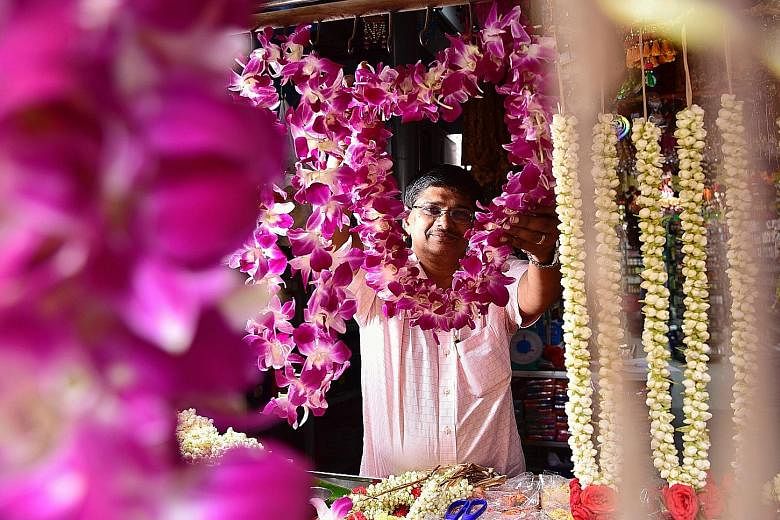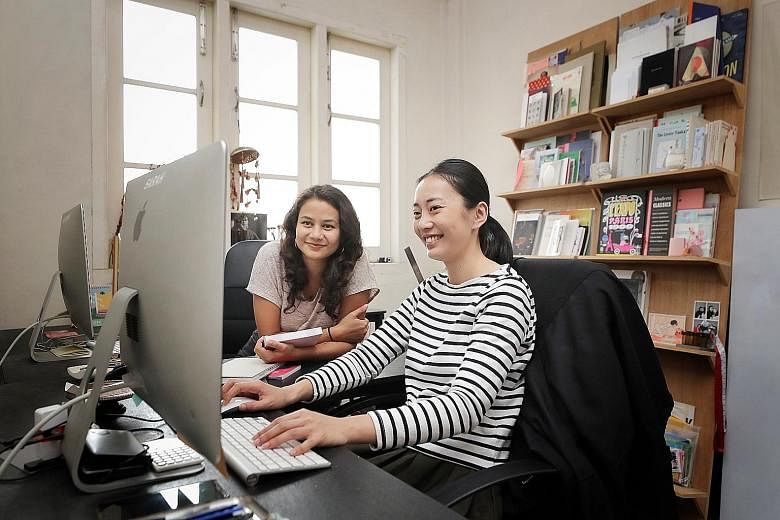Jothi Store and Flower Shop in Little India has supplied hundreds of flower garlands for political parties at every general election since Singapore's Independence.
"Politicians trust us to do their garlands," said its owner Rajakumar Chandra. "It is a privilege."
The 61-year-old is intimately familiar with the preferences of politicians. "Some ministers can't take the smell of jasmine, so we prepare orchid garlands for them."
The July 10 General Election spells big business for suppliers like him, but with safe distancing measures, he does not foresee the usual orders. In past elections, he would get orders exceeding 400 garlands, each costing at least $20.
"That's $8,000 to $10,000 of business gone," he said. "But I don't feel sad. There are more important issues that people have to deal with. Also, they would be more careful with their spending in this economic climate."
Potentially, the business spin-offs from GE2020 could amount to more than $21 million, as 192 candidates go all out to win over 2.65 million voters in 31 constituencies with 93 seats. Under election rules, a candidate is allowed to spend a maximum of $4 per voter in the constituency they are contesting. Since the 2015 polls, the number of eligible voters has swelled by 7.8 per cent to about 2.65 million.
But the campaign spending of parties is shifting online. Traditional activities such as mass rallies - which can cost $10,000 or more for the elaborate stage set-ups and sound systems - and large-scale on-the-ground events are not allowed amid the Covid-19 pandemic, resulting in less fanfare on the ground. Thank-you processions are also not allowed.
So, this time round, long-time vendors like Mr Rajakumar may not get the usual slice of the election pie. Stage vendors, sound crew and food caterers are also losing out to social media experts and production houses - hired to produce live-stream interviews and slick campaign videos - as parties turn to canvassing online and over the airwaves. And firms which design name cards and campaign material, like graphic design studio Sarah and Schooling, are also still needed.
In 2015, the People's Action Party's candidates spent $5.3 million on the 89 seats it contested, while the expenses of opposition candidates totalled $1.8 million, according to spending figures submitted to the Elections Department. On average, the PAP spent $2.16 per voter and the opposition parties 73 cents. Candidates in 2015 were also allowed to spend up to $4 a voter, up from $3.50 in 2011.
For the 2011 polls, the PAP spent $4.2 million contesting 82 out of 87 seats, compared with the opposition's spending of $1.3 million.
On average, this is $1.90 per voter for the PAP and 61 cents for the opposition. At least one-third of the expenses went to publicity materials like banners and posters.
With the battle for votes intensifying in virtual space, will parties spend less in this election?
Observers gave mixed reactions.
Singapore's largest single-seat constituency, held by the PAP's Teo Ho Pin for the past 14 years, has unexpectedly become a hot seat following his retirement. The SMC's 35,497 eligible voters must now choose between PAP parliamentarian Liang Eng Hwa and opposition heavyweight Paul Tambyah. Clement Yong profiles the two candidates and asks them why they should be elected.
Dr Felix Tan, associate lecturer at SIM Global Education, believes parties will cut back on spending, citing the restrictions on large-scale events. "Being frugal in times like these, especially in an economic recession, would certainly bode well for the party as it would reflect its ability to manage its funds effectively," he said.
Singapore Management University law don Eugene Tan differs, saying: "Where parties can afford it, I don't expect them to cut back on their spending. Whatever funds that were allocated for big-ticket items like physical rallies can and will be channelled to other campaign activities such as e-rallies."
Online campaigning is not necessarily more cost-effective, he added: "Parties may have to pay for services such as technical professionals, Internet subscription, server space and the like."
Party activists interviewed said the savings from events that are disallowed this time would be directed to digital efforts, including social media advertising.
SMU's Professor Tan added: "For most parties, we can expect online campaign activities to take up the bulk of their budgets, a reversal from previous elections."
Still, all parties will continue to rely on traditional campaign tools such as posters and fliers to reach out to the less tech-savvy voters.
Most parties let their headquarters coordinate the procurement of campaign materials to take advantage of economies of scale.
Party funds come from donations, fund-raisers or the sale of party merchandise. In GE2015, candidates from a few parties had to each give a few thousand dollars to pay for party needs like posters.
In this election, with the ban on some physical events like mass rallies, where party paraphernalia are typically sold and donations sought, many opposition parties are likely to have a more modest war chest. As their candidates strive to stretch the campaign dollar, some parties will reuse items like plywood boards in good condition. Said an activist: "We work with those who offer more competitive prices and they do so because they support our cause."
But one thing has not changed for most vendors - the pressure to deliver the goods fast and without slip-ups. Said Mr Henry Sim, who has supplied plywood pieces to PAP candidates: "Every election is a rush against time. So we try to stock up before that."



